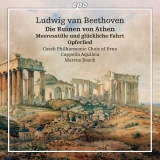 Ludwig van Beethoven: Die Ruinen von Athen, Meeresstille und glückliche Fahrt & Opferlied; Valda Wilson, Sopran, Simon Bailey, Bass, Sidonie von Krosigk Sprecher, Tschechischer Philharmonischer Chor Brünn, Cappella Aquileia, Marcus Bosch; 1 CD cpo 777634-2; Aufnahme 07/2018, Veröffentlichung 05/2020 (53'28) - Rezension von Norbert Tischer
Ludwig van Beethoven: Die Ruinen von Athen, Meeresstille und glückliche Fahrt & Opferlied; Valda Wilson, Sopran, Simon Bailey, Bass, Sidonie von Krosigk Sprecher, Tschechischer Philharmonischer Chor Brünn, Cappella Aquileia, Marcus Bosch; 1 CD cpo 777634-2; Aufnahme 07/2018, Veröffentlichung 05/2020 (53'28) - Rezension von Norbert Tischer

Mit 41 Minuten macht Beethovens Schauspielmusik ‘Die Ruinen von Athen’ den bei weitem größten Teil dieser Produktion mit der Cappella Aquileia und Marcus Bosch aus. Das kommt daher, dass auch die gesprochenen Texte benutzt werden, allerdings nicht in der Fassung, die August von Kotzebue für diese Komposition lieferte, die zur Eröffnung des neuerbauten Theaters in Pest (Budapest) 1812 entstand. Der Text ist in einer ‘bereinigten’ Fassung von Kai Weßler zu hören, der versucht hat, « die für Beethoven wichtige Idee eines klassisch-humanistischen Erbes, das Pallas Athene verkörpert, zu aktualisieren und von der tagespolitischen Bedeutung (und dem ungarischen Nationalismus) zu befreien. » Weßler sagt: « Um eine Sprache zu finden, die dem Pathos von Beethovens Musik standhält », habe er Fragmente von Gedichten Friedrich Schillers eingebaut.
Der Text wird von Sidonie von Krosigh ausdrucksvoll und mit viel Frische dargeboten. Diese Frische findet sich auch in der Interpretation von Marcus Bosch, der Capella Aquileia und dem wie immer exzellenten Philharmonischen Chor aus Brno. Bosch versucht, so wenig wie möglich Pathos in der Musik hörbar zu machen, dafür umso mehr Entschlossenheit und Kraft. Diese Rezeptur greift in den Ruinen wie auch in ‘Meeresstille und glückliche Fahrt’ sowie dem Opferlied, die das Programm vervollständigen.
Die Tonaufnahme ist leider etwas kompakt, sie macht die Musik wenig transparent und begrenzt auch das Spiel der Farben.
At 41 minutes, Beethoven’s incidental music The Ruins of Athens makes up by far the largest part of this production with the Cappella Aquileia and Marcus Bosch. This is because the spoken texts are also used, but not in the version that August von Kotzebue provided for this composition, which was written for the opening of the newly built theatre in Pest (Budapest) in 1812. The text can be heard in a ‘cleaned up’ version by Kai Weßler, who tried to « update the idea of a classical-humanistic heritage embodied by Pallas Athena, which was so important for Beethoven, and to free it from the day-to-day political significance (and Hungarian nationalism) ». Weßler says: « In order to find a language that can withstand the pathos of Beethoven’s music », he has incorporated fragments of poems by Friedrich Schiller.
The text is presented by Sidonie von Krosigh in an expressive and fresh way. This freshness is also found in the interpretation by Marcus Bosch, the Capella Aquileia and the excellent Brno Philharmonic Choir. Bosch tries to use as little pathos in the music as possible, but all the more determination and strength. This recipe is successful in the Ruins, Meeresstille und glückliche Fahrt and the Opferlied which complete the programme.
Unfortunately, the sound recording is a bit compact, which makes the music less transparent and also limits the effect of colours.
























